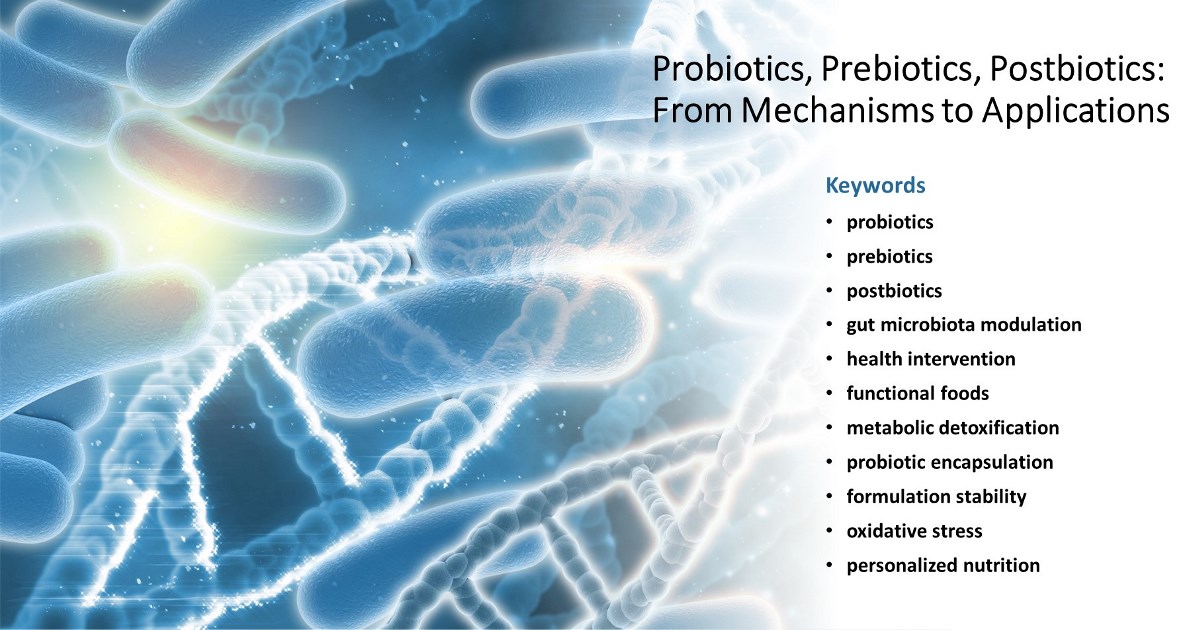- 2.5Impact Factor
- 5.5CiteScore
- 20 daysTime to First Decision
Probiotics, Prebiotics, Postbiotics: From Mechanisms to Applications
This special issue belongs to the section “Food Science and Technology“.
Special Issue Information
Dear Colleagues,
This Special Issue will explore the mechanisms and diverse applications of probiotics, prebiotics, and postbiotics in promoting health and addressing complex pathologies, with a focus on technological innovations in their formulation and optimization. Probiotics, prebiotics, and postbiotics play a critical role in modulating microbiota composition and systemic physiological homeostasis. Core research themes include their efficacy in alleviating liver injury, enhancing metabolic detoxification processes, and mitigating oxidative stress and inflammatory responses.
The scope of this Special Issue covers innovative applications in functional foods and formulation technologies to improve strain stability and bioavailability during production, storage, and gastrointestinal transit. Additionally, this Special Issue will emphasize the optimization of probiotic encapsulation techniques for intestine-targeted delivery, their controlled-release efficacy, and their potential in personalized nutritional interventions. Submissions may focus on mechanistic studies (e.g., gut microbiota modulation, short-chain fatty acid synthesis), animal models, clinical trials, or translational research, while addressing challenges such as strain specificity, scalable manufacturing processes, and regulatory safety evaluations.
We welcome multidisciplinary contributions across fields including microbiology, food engineering, pharmaceutical research and development, and nutritional sciences to advance the frontiers of applications of probiotics/prebiotics/postbiotics in therapeutic strategies, functional food development, and precision health management.
Prof. Dr. Hengyi Xu
Guest Editor
Manuscript Submission Information
Manuscripts should be submitted online at www.mdpi.com by registering and logging in to this website. Once you are registered, click here to go to the submission form. Manuscripts can be submitted until the deadline. All submissions that pass pre-check are peer-reviewed. Accepted papers will be published continuously in the journal (as soon as accepted) and will be listed together on the special issue website. Research articles, review articles as well as short communications are invited. For planned papers, a title and short abstract (about 250 words) can be sent to the Editorial Office for assessment.
Submitted manuscripts should not have been published previously, nor be under consideration for publication elsewhere (except conference proceedings papers). All manuscripts are thoroughly refereed through a single-blind peer-review process. A guide for authors and other relevant information for submission of manuscripts is available on the Instructions for Authors page. Applied Sciences is an international peer-reviewed open access semimonthly journal published by MDPI.
Please visit the Instructions for Authors page before submitting a manuscript. The Article Processing Charge (APC) for publication in this open access journal is 2400 CHF (Swiss Francs). Submitted papers should be well formatted and use good English. Authors may use MDPI's English editing service prior to publication or during author revisions.
Keywords
- probiotics
- prebiotics
- postbiotics
- gut microbiota modulation
- health intervention
- functional foods
- metabolic detoxification
- probiotic encapsulation
- formulation stability
- oxidative stress
- personalized nutrition

Benefits of Publishing in a Special Issue
- Ease of navigation: Grouping papers by topic helps scholars navigate broad scope journals more efficiently.
- Greater discoverability: Special Issues support the reach and impact of scientific research. Articles in Special Issues are more discoverable and cited more frequently.
- Expansion of research network: Special Issues facilitate connections among authors, fostering scientific collaborations.
- External promotion: Articles in Special Issues are often promoted through the journal's social media, increasing their visibility.
- e-Book format: Special Issues with more than 10 articles can be published as dedicated e-books, ensuring wide and rapid dissemination.

